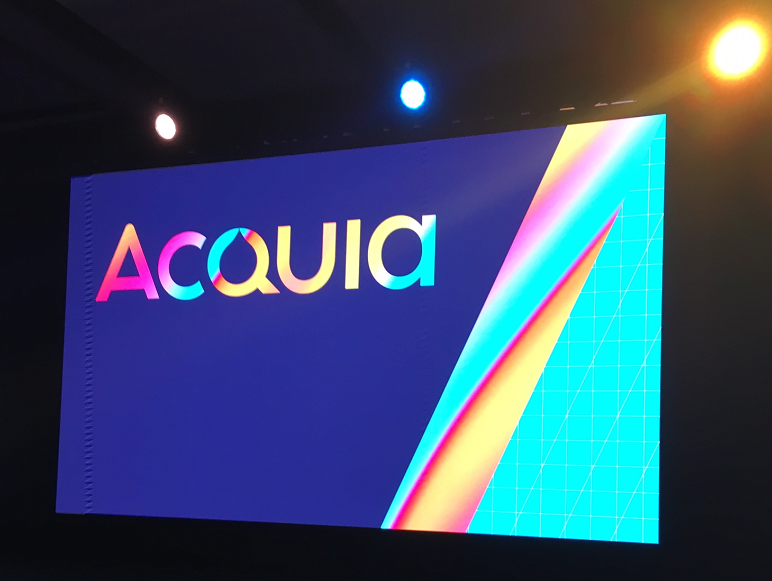Since its founding in 2007, Boston-based Acquia has built an extensive portfolio of content marketing products, based around the open source CMS Drupal, described by Acquia CEO Mike Sullivan at Acquia Engage this week as “the most capable, flexible, powerful CMS on the planet.”
Indeed, Acquia and Drupal have been the content choice for many very large brands —
Johnson & Johnson, Nestlé, Verizon — as well as government agencies, healthcare providers, and colleges.
Two things Acquia customers tend to have in common: extensive digital presences, and IT support to grapple with Drupal’s complexity.
At Engage this week, I saw Acquia take significant steps, both to simplify their product catalog, and to make building digital experiences through Drupal more accessible.
I reached out to product marketing manager Eric Fullerton for some insights.
Cloud times three
My earlier conversation with CMO Lynne Capozzi had focused, not unreasonably, on Acquia’s marketing cloud strategy. In fact, Acquia is not distributing its portfolio of solutions across three clouds: a marketing cloud, a content cloud, and a Drupal cloud. I asked Fullerton to explain the thinking behind this strategy.
“Part of it is, we wanted to simplify how we show our value to customers.” he said. “They’re also aligned to the different buyer types that we’re selling to. It’s really a shift from, here’s what we do, to here’s how our customers are thinking about things. Hosting, building sites, developer tools, that’s one group of people; they tend to be more technical. Then we have the content authors, that’s a different group. And the marketers are super-distinct from all of them, focused on optimization and personalization.”
Drupal is not the simplest thing, Fullerton conceded. On top of that, Acquia is leveraging hosting, services, and support for open source — not the most simple business model. “One thing we can do for our customers is to make it easy to understand the value we can deliver for them.”
It’s worth adding that Acquia does offer Drupal-agnostic products. “We have some customers just doing content. We brought in Mautic this year, which has a customer base which isn’t reliant on Drupal at all. We have customers using Lift for content personalization who don’t use Acquia to host. So we’re really trying to work on our customers’ terms.”
The Mautic piece
Mautic, the open source marketing automation project acquired by Acquia in May 2019, looks like a good fit for the kinds of large, multinational, decentralized clients Acquia sells to. “Absolutely, and any type of franchisee model. We also see [a use case] where there’s a really strong central marketing organization with a small team, say in Australia: they can really quickly copy campaigns, tweak them for localization, and roll them out.”
Acquia is taking the Mautic path itself, moving away from Marketo for marketing automation services. Mautic also offers options for internal operations, including onboarding and HR. “We have customers now, maybe they have Oracle or a big marketing automation platform, but they’re looking at Mautic for things like internal communications. We’re excited about the flexibility of it.”
Then there’s Mautic’s Maestro, appropriately named for an orchestration tool. “If you have two instances of Mautic, maybe doing very separate things, they may not be using the same source of data. But Maestro, it’s like an overview piece for the instances that sit below it, so all your metrics, all your dashboards, all those pieces exist on top of that. You’re orchestrating the orchestration happening in various instances, at a high level.”
Where’s the content?
“We originally built Content Hub because we wanted to have content our customers created in Drupal pushed to Lift for website personalization. You literally tick a box in Content Hub to say you want to use that content for personalization, and it automatically appears in Lift behind the scenes. What we’ve seen is that lots of our customers don’t want to do personalization right now, or they’ve seen that Content Hub can do other things as well.”
For example, Acquia Site Factory allows clients like Bayer to build and manage “thousands” of sites. Customers have recognized that Content Hub can be deployed to power, update, and govern multi-site content.
Cohesion speeds the Drupal process
“Site factory” might actually have been a good name for Cohesion, an Acquia solution which enables enterprise grade websites to be spun up at remarkable speed. Even on Drupal. Essentially, Cohesion is a low code add-on for Drupal. It was demonstrated at Engage by a team of three developers creating a convincing replica of an enterprise website from scratch (they were given the content in pdfs, but no code from the original website). It took them four to five hours.
“It speeds your time to market for Drupal sites. It also enables the non-technical teams to go in and make edits, where they might not be comfortable doing that with some of the bigger sites and platforms and push it to dev teams.”
The Drupal project started out essentially as a community forum, Fullerton pointed out. “Now it’s powering some of the largest enterprise websites in the world.”
Acquia covered DMN’s expenses to attend Engage








